人教版(新课程标准)高考英语二轮复习语法专题突破专题十情态动词和虚拟语气课件(37张ppt)
文档属性
| 名称 | 人教版(新课程标准)高考英语二轮复习语法专题突破专题十情态动词和虚拟语气课件(37张ppt) | 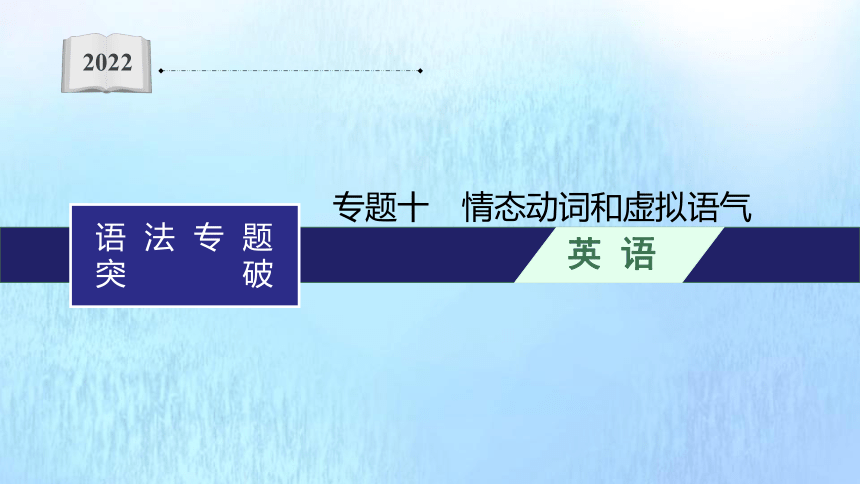 | |
| 格式 | zip | ||
| 文件大小 | 572.3KB | ||
| 资源类型 | 教案 | ||
| 版本资源 | 人教版(新课程标准) | ||
| 科目 | 英语 | ||
| 更新时间 | 2021-08-08 21:49:05 | ||
图片预览


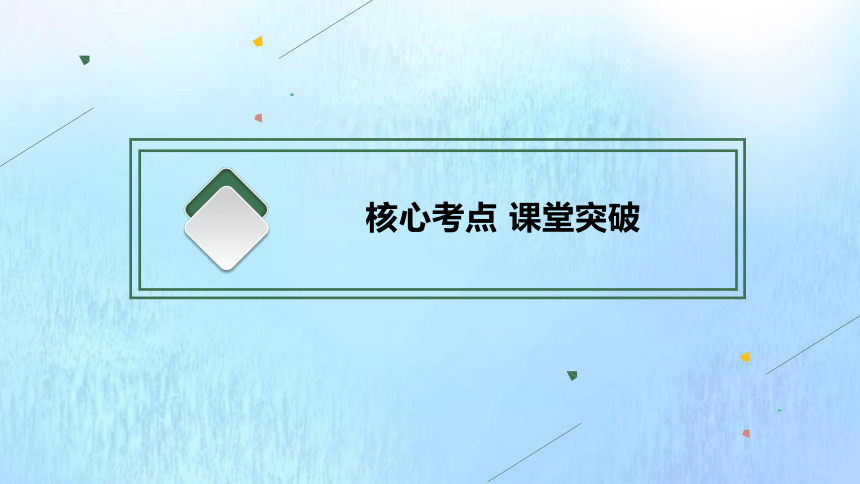
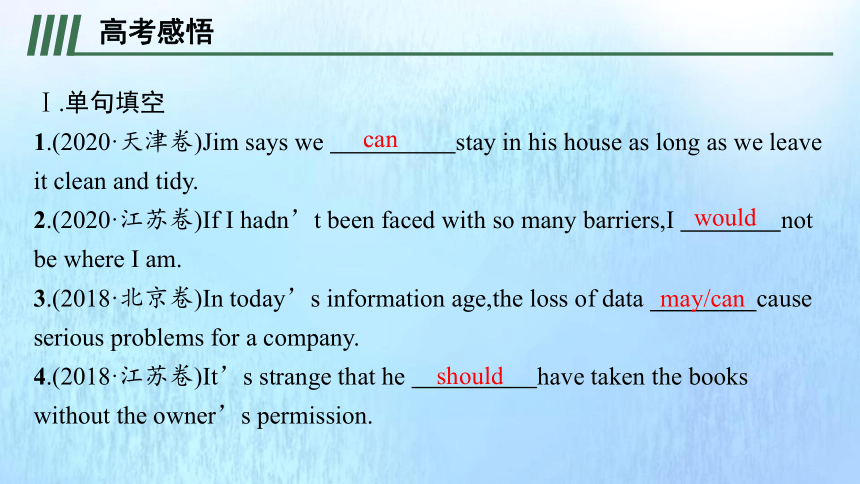

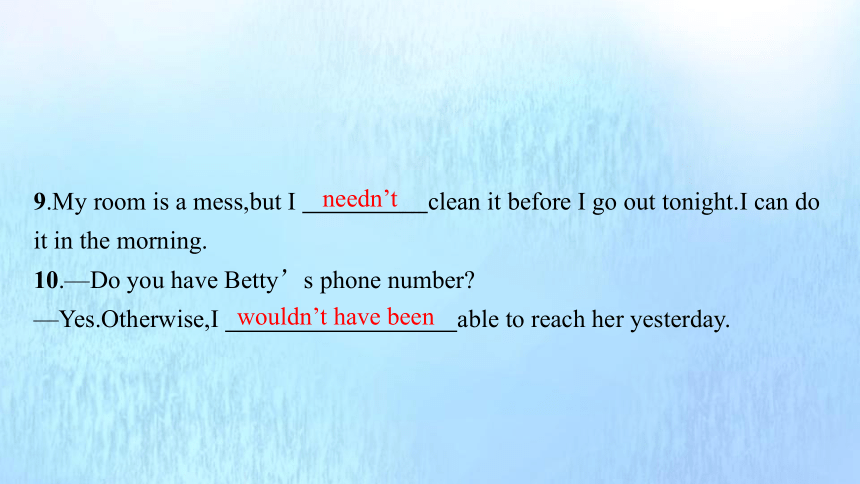
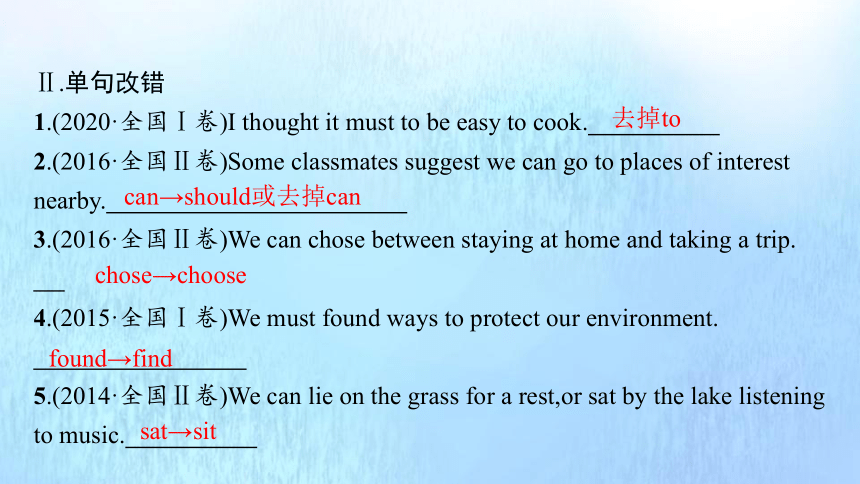
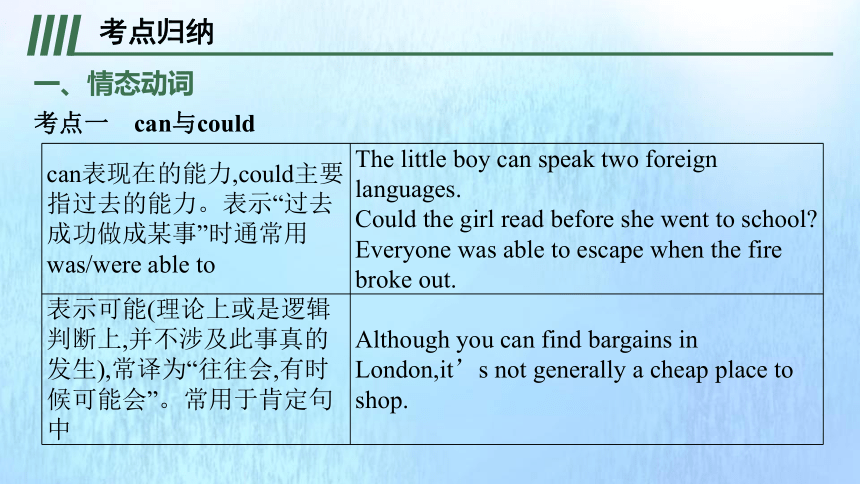
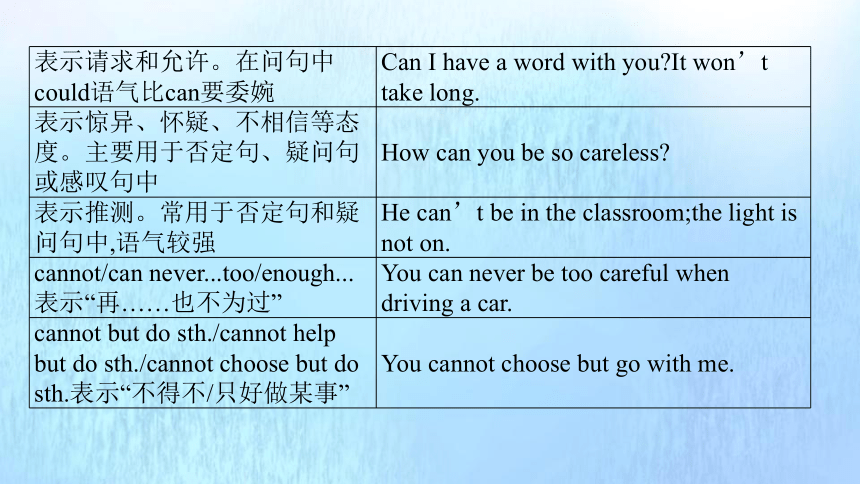



文档简介
(共37张PPT)
语法专题
突破
专题十 情态动词和虚拟语气
英
语
2022
内容索引
核心考点
课堂突破
专项训练
巩固提升
核心考点
课堂突破
高考感悟
Ⅰ.单句填空
1.(2020·天津卷)Jim
says
we
stay
in
his
house
as
long
as
we
leave
it
clean
and
tidy.?
2.(2020·江苏卷)If
I
hadn’t
been
faced
with
so
many
barriers,I
not
be
where
I
am.?
3.(2018·北京卷)In
today’s
information
age,the
loss
of
data
cause
serious
problems
for
a
company.?
4.(2018·江苏卷)It’s
strange
that
he
have
taken
the
books
without
the
owner’s
permission.?
can
would
may/can
should
5.(2018·江苏卷)There
is
a
good
social
life
in
the
village,and
I
wish
I
(have)
a
second
chance
to
become
more
involved.?
6.(2018·天津卷)I
can’t
find
my
purse.I
(leave)
it
in
the
supermarket
yesterday,but
I’m
not
sure.?
7.(2018·北京卷)They
might
have
found
a
better
hotel
if
they
(drive)
a
few
more
kilometers.?
8.(2018·天津卷)If
we
(catch)
the
flight
yesterday,we
would
be
enjoying
our
holiday
on
the
beach.?
had
could/might
have
left
had
driven
had
caught
9.My
room
is
a
mess,but
I
clean
it
before
I
go
out
tonight.I
can
do
it
in
the
morning.?
10.—Do
you
have
Betty’s
phone
number?
—Yes.Otherwise,I
able
to
reach
her
yesterday.?
needn’t
wouldn’t
have
been
Ⅱ.单句改错
1.(2020·全国Ⅰ卷)I
thought
it
must
to
be
easy
to
cook. ?
2.(2016·全国Ⅱ卷)Some
classmates
suggest
we
can
go
to
places
of
interest
nearby.
?
3.(2016·全国Ⅱ卷)We
can
chose
between
staying
at
home
and
taking
a
trip.
?
4.(2015·全国Ⅰ卷)We
must
found
ways
to
protect
our
environment.
?
5.(2014·全国Ⅱ卷)We
can
lie
on
the
grass
for
a
rest,or
sat
by
the
lake
listening
to
music. ?
去掉to
can→should或去掉can
chose→choose
found→find
sat→sit
考点归纳
一、情态动词
考点一 can与could
can表现在的能力,could主要指过去的能力。表示“过去成功做成某事”时通常用was/were
able
to
The
little
boy
can
speak
two
foreign
languages.
Could
the
girl
read
before
she
went
to
school?
Everyone
was
able
to
escape
when
the
fire
broke
out.
表示可能(理论上或是逻辑判断上,并不涉及此事真的发生),常译为“往往会,有时候可能会”。常用于肯定句中
Although
you
can
find
bargains
in
London,it’s
not
generally
a
cheap
place
to
shop.
表示请求和允许。在问句中could语气比can要委婉
Can
I
have
a
word
with
you?It
won’t
take
long.
表示惊异、怀疑、不相信等态度。主要用于否定句、疑问句或感叹句中
How
can
you
be
so
careless?
表示推测。常用于否定句和疑问句中,语气较强
He
can’t
be
in
the
classroom;the
light
is
not
on.
cannot/can
never...too/enough...表示“再……也不为过”
You
can
never
be
too
careful
when
driving
a
car.
cannot
but
do
sth./cannot
help
but
do
sth./cannot
choose
but
do
sth.表示“不得不/只好做某事”
You
cannot
choose
but
go
with
me.
考点二 shall
用于第二、三人称的陈述句中,表示命令、许诺、警告、强制、威胁、决心等;此外,颁布法律、规定时也用shall
You
shall
do
as
your
father
says.
Each
party
shall
respect
the
articles
of
this
contract.
用于第一、三人称的疑问句中,表示说话人征求对方的意见或向对方指示
Shall
the
man
standing
outside
have
a
try?
考点三 must
表示主观上的“必须,应该”,其否定形式mustn’t表示禁止。对比:have
to表示客观上的“不得不”,可用于各种时态
The
work
must
be
finished
as
soon
as
possible.
OK,then,you
mustn’t
forget
your
medical
card.
以must开头的问句,其否定回答用needn’t或don’t
have
to
—Must
I
pay
in
cash?
—No,you
needn’t/don’t
have
to.
表示“非要,偏要”做某事,表达出说话者的一种不满情绪
—Can
I
smoke
here?
—No.Go
to
the
smoking
section,if
you
must.
表示对具体事情的推测,意为
“一定,肯定”,语气较强,只用于肯定句中
Since
nobody
gave
him
any
help,he
must
have
done
the
research
on
his
own.
考点四 should与ought
to
表示义务,常译为“应该”,用于各种人称。ought
to的语气比should强烈
Parents
should/ought
to
take
good
care
of
their
babies.
表示推测,译为“可能,(按道理)应该”,多指对未来合乎理想的情况或结果的一种期盼
It’s
nearly
8
o’clock.He
should
be
here
at
the
moment.
表示惊讶、意外等,常译为“竟然,居然”
You
should
wear
slippers
in
the
classroom.
用在if条件句中,should表示可能性很小的一种虚拟语气
If
I
should
see
him,I
would
tell
him
the
news.
考点五 will与would
表示意愿,用于各种人称的陈述句中。would常指过去的意愿
If
you
will
read
the
book,I’ll
give
it
to
you.
表示请求、建议,常用于第二人称,用在疑问句中。would语气较委婉
Will
you
please
close
the
window?
表示某种倾向或习惯性动作,常译为“总是,惯于”
The
door
wouldn’t
open,no
matter
how
hard
she
pushed.
注意would
可表示过去反复发生的动作或某种倾向,后面接表示动作的动词,不能接表示状态的词。used
to表示过去的习惯动作或状态,强调现在已不存在。
I
still
remember
my
happy
childhood
when
my
mother
would
take
me
to
Disneyland
at
weekends.
考点六 may与might
表示请求、允许、许可,might比may语气委婉
You
may
use
my
bike.
表示推测,常用于陈述句中,语气比较弱,把握性不大。might语气比may还要弱
Life
is
unpredictable;even
the
poorest
might/may
become
the
richest.
may/might
as
well+动词原形,意为
“最好,倒不如……”
You
may/might
as
well
do
it
at
once.
may
well+动词原形,意为“完全能,很可能”
He
may
well
be
late
for
class.
may用于祈使句中,表示祝愿
May
you
return
in
safety!
考点七 need
与dare
两者都可以作为情态动词和实义动词。当作情态动词时,后面要接动词原形,通常用于否定句、疑问句和条件句中。用作实义动词时,其变化和一般的动词相同,有人称和数的变化,构成否定句和疑问句时要借助于助动词do,does,did。dare用作实义动词,用于否定句和疑问句时,常省略后面的to
—I’ve
prepared
all
kinds
of
food
for
the
picnic.
—Do
you
mean
we
needn’t
bring
anything
with
us?
The
little
girl
didn’t
dare
(to)
go
out
at
night
alone.
need用作实义动词时,若主语为动作的承受者,用谓语动词的主动形式表示被动意义或用不定式的被动形式
The
house
needs
repairing.=The
house
needs
to
be
repaired.
I
dare
say为习惯说法,意为“我想,大概”
I
dare
say
she
dare
not
speak
to
her
father
in
this
manner.
考点八 情态动词表推测
在肯定句中都可以用来表示可能性。在含义上must语气最肯定,may表示不太肯定的可能性,而can表示理论上的可能性
The
news
must
be
true.
在否定句中只能用cannot/can’t和may
not。can’t(不可能)语气比may
not(可能不、也许不)更强
The
news
can’t
be
true.
在疑问句中只能用can,不能用may和must
Can
the
news
be
true?
should
与ought
to
可以表示对未来情况的一种期盼,常译为“按理应当”
He
should/ought
to
be
here
on
time—he
started
early.
考点九 情态动词+have
done
could
have
done本可以
You
could
have
passed
the
exam,but
you
were
so
careless.
can’t/couldn’t
have
done不可能做过
I
couldn’t
have
enjoyed
myself
more—it
was
a
perfect
day.
may/might
have
done可能做过
Sorry,I’m
late.I
might
have
turned
off
the
alarm
clock
and
gone
back
to
sleep
again.
must
have
done一定做过
The
ground
is
wet.It
must
have
rained
last
night.
should/ought
to
have
done本应该/竟然做过
Look!
There
are
so
many
mistakes
in
your
composition.You
should
have
fixed
full
attention
on
it.
needn’t
have
done本不需要做
You
needn’t
have
gone
to
school,for
it
is
Sunday
today.
had
better
have
done当时最好做过
We
had
better
have
remained
at
home
when
our
uncle
visited
us
that
day.
would
like/love
to
have
done宁愿做过
I
would
like
to
have
helped
you,but
I
was
too
busy
then.
二、虚拟语气
考点一 虚拟语气用于条件句中
If条件句的虚拟语气
用法
例句
与现在
事实相反
从句动词:过去式(be用were)
主句动词:should/would/could/might+动词原形
If
he
were
here,he
would
help
us.
与过去
事实相反
从句动词:had+过去分词
主句动词:should/would/could/might
+have+过去分词
If
I
had
been
free,I
would
have
visited
you.
与将来
事实相反
从句动词:过去式/should+动词原形/were+不定式
主句动词:should/would/could/might+动词原形
If
it
should
rain
tomorrow,we
would
not
go
camping.
注意1.有时候假设的情况不以if引导的条件句形式表现出来,而是通过一个介词短语、连词或其他形式表示。常用的词或短语有:without,with,but
for(要是没有),otherwise,or,but等。
But
for
your
advice,I
could
not
have
done
it
so
successfully.
2.当条件状语从句表示的行为和主句表示的行为所发生的时间不一致时,称为“错综时间条件句”,动词的形式要根据主从句所表示的时间做出相应的调整。
If
we
had
booked
a
table
earlier,we
wouldn’t
be
standing
here
in
a
queue.(从句说的是过去的情况,主句说的是现在的情况)
If
I
were
you,I
would
have
gone
abroad.(从句说的是现在的情况,主句说的是过去的情况)
3.省略if的虚拟语气
如果if从句中含有were/should/had时,则可以省略if,把这三个词置于句首,采用倒装语序。
If
I
were
you,I
would
go
to
the
party.→Were
I
you,I
would
go
to
the
party.
If
it
should
happen,what
would
you
do?→Should
it
happen,what
would
you
do?
If
you
had
come
earlier,you
would
catch
the
bus.→Had
you
come
earlier,you
would
catch
the
bus.
考点二 wish宾语从句中的虚拟语气用法
与现在
事实相反
过去式(be
动词用were)
—Do
you
like
the
school?
—Yeah.I
only
wish
the
classes
were
a
little
smaller.
与过去
事实相反
had+
过去分词
I
wish
I
had
been
at
my
sister’s
wedding
last
Tuesday,but
I
was
on
a
business
trip
in
New
York
then.
与将来
事实相反
would/could/
might+动词原形
I
wish
it
would
be
fine
tomorrow.
考点三 谓语必须用“(should+)
动词原形”的情况
表示“建议,要求,命令”的动词:一坚持(insist),二命令(order,command),三建议(suggest,recommend,advise),四要求(demand,require,request,ask)后面的宾语从句或由it作形式主语的主语从句中的谓语要用“(should+)
动词原形”。这些动词相应的名词后的表语从句和同位语从句中的谓语也要用“(should+)
动词原形”。
The
teacher
ordered
that
the
homework
(should)
be
handed
in
on
time.
My
mom
suggests
that
we
(should)
eat
out
for
a
change
this
weekend.
在It
is
important/strange/natural/
necessary/a
pity/a
shame等+that从句,表示情绪、观点等的句型中,主语从句中的谓语用“(should+)
动词原形”。
It
is
a
pity
that
he
(should)
refuse
to
accept
the
offer.
注意suggest当“表明,暗示”讲时,不用虚拟语气;insist
当“坚持认为”讲时,不用虚拟语气。
The
smile
on
his
face
suggested
he
was
happy.
他脸上的笑容表明他很开心。
The
boy
insisted
he
hadn’t
stolen
the
money.
那个男孩坚持说他没有偷钱。
考点四 虚拟语气在其他句型中的使用
as
if/as
though
好像
当从句的动作与主句的动作同时发生时,从句谓语动词用过去式
He
talks
as
if
he
knew
all
about
it.
He
walked
in
as
if
he
had
bought
the
school.
It
is
(high)
time
that...该是……的时候了
从句谓语动词常用过去式
It’s
high
time
that
he
did
something
instead
of
just
talking.
would
rather宁愿
当从句表示与现在或将来事实相反时,从句谓语动词用过去式。
当从句表示与过去事实相反时,谓语动词用过去完成式
I
would
rather
our
daughter
stayed
at
home
with
us,but
it
is
her
choice,and
she
is
not
a
child
any
longer.
I’d
rather
you
hadn’t
told
Mike
the
bad
news.
if
only要是……多好
表示与现在或将来事实相反的愿望时,句子谓语动词用过去式;表示与过去事实相反的愿望时,句子谓语动词用过去完成式
If
only
I
had
passed
the
driving
test
last
week!
专项训练
巩固提升
Ⅰ.单句填空
1.—Could
I
look
at
your
pictures?
—Yes,of
course
you
.?
2.I
wish
I
able
to
tell
him
all
about
it
last
night.?
3.If
I
(have)
more
time,I
would
have
gone
with
him.?
4.The
Jade
Emperor
ordered
that
the
Monkey
King
(arrest)
right
away.?
5.The
man
insisted
that
he
(send)
there.?
can
had
been
had
had
(should)be
arrested
(should)be
sent
6.How
I
wish
I
(can)
be
three
years
younger!?
7. (be)
I
you,I
would
take
an
umbrella
with
me.?
8.Look
at
the
clock!It’s
(high)
time
we
(go)
home.?
9.He
ordered
the
work
(start)
at
once.?
10.I’d
rather
you
(stay)
at
home
all
day
today.?
could
Were
went
(should)
be
started
stayed
Ⅱ.单句改错
1.You
can
be
Carol.You
haven’t
changed
a
bit
after
all
these
years. ?
2.He
brother
mustn’t
be
at
home
now,because
he
was
seen
playing
basketball
in
the
stadium
just
now.
?
3.What
do
you
think
I
should
do?If
you
are
me,would
you
talk
to
them?
?
4.Dare
you
to
tell
your
parents
about
your
school
records?
?
5.It
was
suggested
that
an
armed
guard
stood
in
readiness,protecting
the
president.
?
can→must
mustn’t→can’t
are→were
stood→stand
去掉tell前的to
6.He
feels
as
if
he
is
floating
on
a
cloud. ?
7.If
I
haven’t
seen
it
with
my
own
eyes,I
wouldn’t
have
believed
it.
?
8.He
will
recover
soon.You
can’t
worry
about
him.
?
9.I
still
remember
my
happy
childhood
when
my
mother
will
take
me
to
Disneyland
at
weekends.
?
10.Sorry,I
am
too
busy
now.If
I
have
time,I
would
certainly
go
for
an
outing
with
you. ?
is→were
haven’t→hadn’t
can’t→needn’t
will→would
have→had
Ⅲ.语法填空
Miss
Fang
1.
(not)
read
for
very
long
without
getting
a
headache.Her
mother
told
her
that
she
2.
go
to
the
Health
Service
and
see
a
doctor.“You
3.
see
a
doctor
as
soon
as
possible,”she
said.“You
4.
need
glasses.”?
When
Miss
Fang
had
free
time,she
went
to
the
Health
Service.The
appointment
clerk
said
that
the
doctor
5.
see
her
at
3:30.
Miss
Fang
replied
that
she
6.
not
be
able
to
be
there
at
3:30
because
she
had
a
class
then.“The
doctor
7.
take
you
at
about
ten
to
four,”
the
appointment
clerk
suggested.?
couldn’t
should
should
might
could
would
might
“8.
I
put
you
down
for
ten
to
four,or
9.
you
rather
come
tomorrow?”?
Miss
Fang
thought
she
10.
(not)
waste
any
more
time.The
teacher
11.
be
unhappy
if
she
asked
for
permission
to
leave
the
class
a
little
early,as
he
was
always
so
kind
to
everyone.And
she
replied,“I
think
I
12.
make
it
at
ten
to
four.”?
Miss
Fang
went
to
the
class.She
asked
her
teacher,“13.
I
leave
at
3:45
today?I
14.
have
an
eye
examination.”
As
expected,the
teacher
said,“Yes,of
course
you
15. .”?
Shall
would
shouldn’t
shouldn’t
can
May/Can
must
can
Ⅳ.短文改错
Dear
mum
and
Dad,
The
College
Entrance
Examination
is
around
the
corner.I
wish
I
can
have
a
heart-to-heart
talk
about
you.The
exam
will
be
in
three
weeks,what
makes
me
under
great
pressure.So
I
need
your
frequent
support
and
time
help.
Mom
and
Dad,I
am
full
aware
of
my
responsibilities.In
order
to
make
a
full
use
of
the
time,I
decide
to
make
a
little
detailed
study
plans
for
the
exam.It’s
also
necessary
that
I
did
some
physical
exercise
once
in
a
while
so
that
I
keep
healthy.All
in
all,I’m
quite
confident
of
my
future
life
and
I
do
hope
you
good
health
and
a
happy
life.
Yours
Li
Hua
语法专题
突破
专题十 情态动词和虚拟语气
英
语
2022
内容索引
核心考点
课堂突破
专项训练
巩固提升
核心考点
课堂突破
高考感悟
Ⅰ.单句填空
1.(2020·天津卷)Jim
says
we
stay
in
his
house
as
long
as
we
leave
it
clean
and
tidy.?
2.(2020·江苏卷)If
I
hadn’t
been
faced
with
so
many
barriers,I
not
be
where
I
am.?
3.(2018·北京卷)In
today’s
information
age,the
loss
of
data
cause
serious
problems
for
a
company.?
4.(2018·江苏卷)It’s
strange
that
he
have
taken
the
books
without
the
owner’s
permission.?
can
would
may/can
should
5.(2018·江苏卷)There
is
a
good
social
life
in
the
village,and
I
wish
I
(have)
a
second
chance
to
become
more
involved.?
6.(2018·天津卷)I
can’t
find
my
purse.I
(leave)
it
in
the
supermarket
yesterday,but
I’m
not
sure.?
7.(2018·北京卷)They
might
have
found
a
better
hotel
if
they
(drive)
a
few
more
kilometers.?
8.(2018·天津卷)If
we
(catch)
the
flight
yesterday,we
would
be
enjoying
our
holiday
on
the
beach.?
had
could/might
have
left
had
driven
had
caught
9.My
room
is
a
mess,but
I
clean
it
before
I
go
out
tonight.I
can
do
it
in
the
morning.?
10.—Do
you
have
Betty’s
phone
number?
—Yes.Otherwise,I
able
to
reach
her
yesterday.?
needn’t
wouldn’t
have
been
Ⅱ.单句改错
1.(2020·全国Ⅰ卷)I
thought
it
must
to
be
easy
to
cook. ?
2.(2016·全国Ⅱ卷)Some
classmates
suggest
we
can
go
to
places
of
interest
nearby.
?
3.(2016·全国Ⅱ卷)We
can
chose
between
staying
at
home
and
taking
a
trip.
?
4.(2015·全国Ⅰ卷)We
must
found
ways
to
protect
our
environment.
?
5.(2014·全国Ⅱ卷)We
can
lie
on
the
grass
for
a
rest,or
sat
by
the
lake
listening
to
music. ?
去掉to
can→should或去掉can
chose→choose
found→find
sat→sit
考点归纳
一、情态动词
考点一 can与could
can表现在的能力,could主要指过去的能力。表示“过去成功做成某事”时通常用was/were
able
to
The
little
boy
can
speak
two
foreign
languages.
Could
the
girl
read
before
she
went
to
school?
Everyone
was
able
to
escape
when
the
fire
broke
out.
表示可能(理论上或是逻辑判断上,并不涉及此事真的发生),常译为“往往会,有时候可能会”。常用于肯定句中
Although
you
can
find
bargains
in
London,it’s
not
generally
a
cheap
place
to
shop.
表示请求和允许。在问句中could语气比can要委婉
Can
I
have
a
word
with
you?It
won’t
take
long.
表示惊异、怀疑、不相信等态度。主要用于否定句、疑问句或感叹句中
How
can
you
be
so
careless?
表示推测。常用于否定句和疑问句中,语气较强
He
can’t
be
in
the
classroom;the
light
is
not
on.
cannot/can
never...too/enough...表示“再……也不为过”
You
can
never
be
too
careful
when
driving
a
car.
cannot
but
do
sth./cannot
help
but
do
sth./cannot
choose
but
do
sth.表示“不得不/只好做某事”
You
cannot
choose
but
go
with
me.
考点二 shall
用于第二、三人称的陈述句中,表示命令、许诺、警告、强制、威胁、决心等;此外,颁布法律、规定时也用shall
You
shall
do
as
your
father
says.
Each
party
shall
respect
the
articles
of
this
contract.
用于第一、三人称的疑问句中,表示说话人征求对方的意见或向对方指示
Shall
the
man
standing
outside
have
a
try?
考点三 must
表示主观上的“必须,应该”,其否定形式mustn’t表示禁止。对比:have
to表示客观上的“不得不”,可用于各种时态
The
work
must
be
finished
as
soon
as
possible.
OK,then,you
mustn’t
forget
your
medical
card.
以must开头的问句,其否定回答用needn’t或don’t
have
to
—Must
I
pay
in
cash?
—No,you
needn’t/don’t
have
to.
表示“非要,偏要”做某事,表达出说话者的一种不满情绪
—Can
I
smoke
here?
—No.Go
to
the
smoking
section,if
you
must.
表示对具体事情的推测,意为
“一定,肯定”,语气较强,只用于肯定句中
Since
nobody
gave
him
any
help,he
must
have
done
the
research
on
his
own.
考点四 should与ought
to
表示义务,常译为“应该”,用于各种人称。ought
to的语气比should强烈
Parents
should/ought
to
take
good
care
of
their
babies.
表示推测,译为“可能,(按道理)应该”,多指对未来合乎理想的情况或结果的一种期盼
It’s
nearly
8
o’clock.He
should
be
here
at
the
moment.
表示惊讶、意外等,常译为“竟然,居然”
You
should
wear
slippers
in
the
classroom.
用在if条件句中,should表示可能性很小的一种虚拟语气
If
I
should
see
him,I
would
tell
him
the
news.
考点五 will与would
表示意愿,用于各种人称的陈述句中。would常指过去的意愿
If
you
will
read
the
book,I’ll
give
it
to
you.
表示请求、建议,常用于第二人称,用在疑问句中。would语气较委婉
Will
you
please
close
the
window?
表示某种倾向或习惯性动作,常译为“总是,惯于”
The
door
wouldn’t
open,no
matter
how
hard
she
pushed.
注意would
可表示过去反复发生的动作或某种倾向,后面接表示动作的动词,不能接表示状态的词。used
to表示过去的习惯动作或状态,强调现在已不存在。
I
still
remember
my
happy
childhood
when
my
mother
would
take
me
to
Disneyland
at
weekends.
考点六 may与might
表示请求、允许、许可,might比may语气委婉
You
may
use
my
bike.
表示推测,常用于陈述句中,语气比较弱,把握性不大。might语气比may还要弱
Life
is
unpredictable;even
the
poorest
might/may
become
the
richest.
may/might
as
well+动词原形,意为
“最好,倒不如……”
You
may/might
as
well
do
it
at
once.
may
well+动词原形,意为“完全能,很可能”
He
may
well
be
late
for
class.
may用于祈使句中,表示祝愿
May
you
return
in
safety!
考点七 need
与dare
两者都可以作为情态动词和实义动词。当作情态动词时,后面要接动词原形,通常用于否定句、疑问句和条件句中。用作实义动词时,其变化和一般的动词相同,有人称和数的变化,构成否定句和疑问句时要借助于助动词do,does,did。dare用作实义动词,用于否定句和疑问句时,常省略后面的to
—I’ve
prepared
all
kinds
of
food
for
the
picnic.
—Do
you
mean
we
needn’t
bring
anything
with
us?
The
little
girl
didn’t
dare
(to)
go
out
at
night
alone.
need用作实义动词时,若主语为动作的承受者,用谓语动词的主动形式表示被动意义或用不定式的被动形式
The
house
needs
repairing.=The
house
needs
to
be
repaired.
I
dare
say为习惯说法,意为“我想,大概”
I
dare
say
she
dare
not
speak
to
her
father
in
this
manner.
考点八 情态动词表推测
在肯定句中都可以用来表示可能性。在含义上must语气最肯定,may表示不太肯定的可能性,而can表示理论上的可能性
The
news
must
be
true.
在否定句中只能用cannot/can’t和may
not。can’t(不可能)语气比may
not(可能不、也许不)更强
The
news
can’t
be
true.
在疑问句中只能用can,不能用may和must
Can
the
news
be
true?
should
与ought
to
可以表示对未来情况的一种期盼,常译为“按理应当”
He
should/ought
to
be
here
on
time—he
started
early.
考点九 情态动词+have
done
could
have
done本可以
You
could
have
passed
the
exam,but
you
were
so
careless.
can’t/couldn’t
have
done不可能做过
I
couldn’t
have
enjoyed
myself
more—it
was
a
perfect
day.
may/might
have
done可能做过
Sorry,I’m
late.I
might
have
turned
off
the
alarm
clock
and
gone
back
to
sleep
again.
must
have
done一定做过
The
ground
is
wet.It
must
have
rained
last
night.
should/ought
to
have
done本应该/竟然做过
Look!
There
are
so
many
mistakes
in
your
composition.You
should
have
fixed
full
attention
on
it.
needn’t
have
done本不需要做
You
needn’t
have
gone
to
school,for
it
is
Sunday
today.
had
better
have
done当时最好做过
We
had
better
have
remained
at
home
when
our
uncle
visited
us
that
day.
would
like/love
to
have
done宁愿做过
I
would
like
to
have
helped
you,but
I
was
too
busy
then.
二、虚拟语气
考点一 虚拟语气用于条件句中
If条件句的虚拟语气
用法
例句
与现在
事实相反
从句动词:过去式(be用were)
主句动词:should/would/could/might+动词原形
If
he
were
here,he
would
help
us.
与过去
事实相反
从句动词:had+过去分词
主句动词:should/would/could/might
+have+过去分词
If
I
had
been
free,I
would
have
visited
you.
与将来
事实相反
从句动词:过去式/should+动词原形/were+不定式
主句动词:should/would/could/might+动词原形
If
it
should
rain
tomorrow,we
would
not
go
camping.
注意1.有时候假设的情况不以if引导的条件句形式表现出来,而是通过一个介词短语、连词或其他形式表示。常用的词或短语有:without,with,but
for(要是没有),otherwise,or,but等。
But
for
your
advice,I
could
not
have
done
it
so
successfully.
2.当条件状语从句表示的行为和主句表示的行为所发生的时间不一致时,称为“错综时间条件句”,动词的形式要根据主从句所表示的时间做出相应的调整。
If
we
had
booked
a
table
earlier,we
wouldn’t
be
standing
here
in
a
queue.(从句说的是过去的情况,主句说的是现在的情况)
If
I
were
you,I
would
have
gone
abroad.(从句说的是现在的情况,主句说的是过去的情况)
3.省略if的虚拟语气
如果if从句中含有were/should/had时,则可以省略if,把这三个词置于句首,采用倒装语序。
If
I
were
you,I
would
go
to
the
party.→Were
I
you,I
would
go
to
the
party.
If
it
should
happen,what
would
you
do?→Should
it
happen,what
would
you
do?
If
you
had
come
earlier,you
would
catch
the
bus.→Had
you
come
earlier,you
would
catch
the
bus.
考点二 wish宾语从句中的虚拟语气用法
与现在
事实相反
过去式(be
动词用were)
—Do
you
like
the
school?
—Yeah.I
only
wish
the
classes
were
a
little
smaller.
与过去
事实相反
had+
过去分词
I
wish
I
had
been
at
my
sister’s
wedding
last
Tuesday,but
I
was
on
a
business
trip
in
New
York
then.
与将来
事实相反
would/could/
might+动词原形
I
wish
it
would
be
fine
tomorrow.
考点三 谓语必须用“(should+)
动词原形”的情况
表示“建议,要求,命令”的动词:一坚持(insist),二命令(order,command),三建议(suggest,recommend,advise),四要求(demand,require,request,ask)后面的宾语从句或由it作形式主语的主语从句中的谓语要用“(should+)
动词原形”。这些动词相应的名词后的表语从句和同位语从句中的谓语也要用“(should+)
动词原形”。
The
teacher
ordered
that
the
homework
(should)
be
handed
in
on
time.
My
mom
suggests
that
we
(should)
eat
out
for
a
change
this
weekend.
在It
is
important/strange/natural/
necessary/a
pity/a
shame等+that从句,表示情绪、观点等的句型中,主语从句中的谓语用“(should+)
动词原形”。
It
is
a
pity
that
he
(should)
refuse
to
accept
the
offer.
注意suggest当“表明,暗示”讲时,不用虚拟语气;insist
当“坚持认为”讲时,不用虚拟语气。
The
smile
on
his
face
suggested
he
was
happy.
他脸上的笑容表明他很开心。
The
boy
insisted
he
hadn’t
stolen
the
money.
那个男孩坚持说他没有偷钱。
考点四 虚拟语气在其他句型中的使用
as
if/as
though
好像
当从句的动作与主句的动作同时发生时,从句谓语动词用过去式
He
talks
as
if
he
knew
all
about
it.
He
walked
in
as
if
he
had
bought
the
school.
It
is
(high)
time
that...该是……的时候了
从句谓语动词常用过去式
It’s
high
time
that
he
did
something
instead
of
just
talking.
would
rather宁愿
当从句表示与现在或将来事实相反时,从句谓语动词用过去式。
当从句表示与过去事实相反时,谓语动词用过去完成式
I
would
rather
our
daughter
stayed
at
home
with
us,but
it
is
her
choice,and
she
is
not
a
child
any
longer.
I’d
rather
you
hadn’t
told
Mike
the
bad
news.
if
only要是……多好
表示与现在或将来事实相反的愿望时,句子谓语动词用过去式;表示与过去事实相反的愿望时,句子谓语动词用过去完成式
If
only
I
had
passed
the
driving
test
last
week!
专项训练
巩固提升
Ⅰ.单句填空
1.—Could
I
look
at
your
pictures?
—Yes,of
course
you
.?
2.I
wish
I
able
to
tell
him
all
about
it
last
night.?
3.If
I
(have)
more
time,I
would
have
gone
with
him.?
4.The
Jade
Emperor
ordered
that
the
Monkey
King
(arrest)
right
away.?
5.The
man
insisted
that
he
(send)
there.?
can
had
been
had
had
(should)be
arrested
(should)be
sent
6.How
I
wish
I
(can)
be
three
years
younger!?
7. (be)
I
you,I
would
take
an
umbrella
with
me.?
8.Look
at
the
clock!It’s
(high)
time
we
(go)
home.?
9.He
ordered
the
work
(start)
at
once.?
10.I’d
rather
you
(stay)
at
home
all
day
today.?
could
Were
went
(should)
be
started
stayed
Ⅱ.单句改错
1.You
can
be
Carol.You
haven’t
changed
a
bit
after
all
these
years. ?
2.He
brother
mustn’t
be
at
home
now,because
he
was
seen
playing
basketball
in
the
stadium
just
now.
?
3.What
do
you
think
I
should
do?If
you
are
me,would
you
talk
to
them?
?
4.Dare
you
to
tell
your
parents
about
your
school
records?
?
5.It
was
suggested
that
an
armed
guard
stood
in
readiness,protecting
the
president.
?
can→must
mustn’t→can’t
are→were
stood→stand
去掉tell前的to
6.He
feels
as
if
he
is
floating
on
a
cloud. ?
7.If
I
haven’t
seen
it
with
my
own
eyes,I
wouldn’t
have
believed
it.
?
8.He
will
recover
soon.You
can’t
worry
about
him.
?
9.I
still
remember
my
happy
childhood
when
my
mother
will
take
me
to
Disneyland
at
weekends.
?
10.Sorry,I
am
too
busy
now.If
I
have
time,I
would
certainly
go
for
an
outing
with
you. ?
is→were
haven’t→hadn’t
can’t→needn’t
will→would
have→had
Ⅲ.语法填空
Miss
Fang
1.
(not)
read
for
very
long
without
getting
a
headache.Her
mother
told
her
that
she
2.
go
to
the
Health
Service
and
see
a
doctor.“You
3.
see
a
doctor
as
soon
as
possible,”she
said.“You
4.
need
glasses.”?
When
Miss
Fang
had
free
time,she
went
to
the
Health
Service.The
appointment
clerk
said
that
the
doctor
5.
see
her
at
3:30.
Miss
Fang
replied
that
she
6.
not
be
able
to
be
there
at
3:30
because
she
had
a
class
then.“The
doctor
7.
take
you
at
about
ten
to
four,”
the
appointment
clerk
suggested.?
couldn’t
should
should
might
could
would
might
“8.
I
put
you
down
for
ten
to
four,or
9.
you
rather
come
tomorrow?”?
Miss
Fang
thought
she
10.
(not)
waste
any
more
time.The
teacher
11.
be
unhappy
if
she
asked
for
permission
to
leave
the
class
a
little
early,as
he
was
always
so
kind
to
everyone.And
she
replied,“I
think
I
12.
make
it
at
ten
to
four.”?
Miss
Fang
went
to
the
class.She
asked
her
teacher,“13.
I
leave
at
3:45
today?I
14.
have
an
eye
examination.”
As
expected,the
teacher
said,“Yes,of
course
you
15. .”?
Shall
would
shouldn’t
shouldn’t
can
May/Can
must
can
Ⅳ.短文改错
Dear
mum
and
Dad,
The
College
Entrance
Examination
is
around
the
corner.I
wish
I
can
have
a
heart-to-heart
talk
about
you.The
exam
will
be
in
three
weeks,what
makes
me
under
great
pressure.So
I
need
your
frequent
support
and
time
help.
Mom
and
Dad,I
am
full
aware
of
my
responsibilities.In
order
to
make
a
full
use
of
the
time,I
decide
to
make
a
little
detailed
study
plans
for
the
exam.It’s
also
necessary
that
I
did
some
physical
exercise
once
in
a
while
so
that
I
keep
healthy.All
in
all,I’m
quite
confident
of
my
future
life
and
I
do
hope
you
good
health
and
a
happy
life.
Yours
Li
Hua
